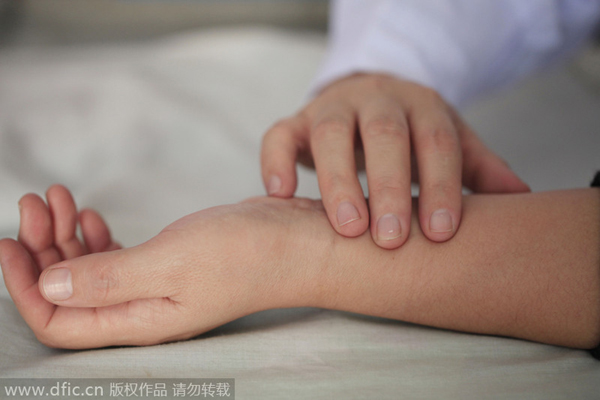TCM doctor denies dodging diagnostic challenge
By WANG XIAODONG (China Daily) Updated: 2014-11-08 08:04
|
 |
| A traditional Chinese medicine physician takes a patient's pulse at a clinic in Beijing, Oct 16, 2014. TCM diagnosis aims to trace symptoms to patterns of an underlying disharmony, by measuring the pulse, inspecting the tongue, skin, and eyes, and looking at the eating and sleeping habits of the person as well as many other things.[Photo/IC] |
Yang Zhen, an associate professor at Beijing University of Chinese Medicine, publicly agreed to take the challenge posed by Ning Fanggang, a doctor of Western medicine at Beijing Jishuitan Hospital, to determine solely by taking their pulse whether 80 percent of a group of women were pregnant.
Ning offered any senior doctor of traditional Chinese medicine at a reputable hospital who could pull off the feat 50,000 yuan ($8,160), an amount soon increased to 100,000 yuan through Internet users' donations.
Ning, who was doubtful of the traditional practices, said in a micro blog post, "If a doctor is successful, I will never state that traditional Chinese medicine is a fake science".
On Thursday, Yang posted a statement online complaining that a plan for the contest released on Monday is seriously flawed and suggested he might not participate.
The organizer "didn't even ask for my opinion before releasing it," Yang said.
Under a previous plan, 104 women would be tested, but the new plan was reduced to 32.
"The result of the test would lack persuasiveness with such a small sample," he said.
He also questioned the legitimacy of the plan, because regulations prohibit doctors from practicing medicine outside the hospital where they registered, he said.
On Friday, Yang denied he would quit, but found the new terms of the contest unsatisfactory and was waiting for them to be improved so he could take part.
Yang could not be reached for comment on Friday.
According to a statement he released online on Thursday, Yang had backed out and he would welcome senior doctors of traditional Chinese medicine from all over China to take the challenge.
No other qualified doctors had agreed as of Thursday, he said, and the contest would be canceled within two weeks if nobody did.
Yang said he had accepted the challenge because he wanted to prove that traditional Chinese medicine is a science. He said the traditional way of testing pregnancy by feeling pulse is supported by science.
When a woman becomes pregnant, the volume of blood in her body increases sharply, he said, leading to enlarged blood vessels, faster blood flow and a faster heart beat.
"I think my chances of winning are more than 80 percent," he added.
The contest has sparked heated discussion on the Internet about the effectciveness of traditional Chinese medicine and many experts have questioned the legitimacy of the contest.
"The pregnancy contest is meaningless," a statement of the State Administration of Traditional Chinese Medicine said.
The administration said taking a pulse is only one of many techniques adopted by the traditional Chinese medicine, whose diagnosis and treatment theories differ from those of Western medicine.
Zhu Qingwen, who practices traditional Chinese medicine at Beijing University of Chinese Medicine, said in traditional Chinese medicine practitioners have also borrowed technics from Western medicine and the two are complementary.
- Govt encourages people to work 4.5 days a week
- Action to be taken as HIV cases among students rise
- Debate grows over reproductive rights
- Country's first bishop ordained in 3 years
- China builds Tibetan Buddhism academy in Chengdu
- Authorities require reporting of HIV infections at schools
- Typhoon Soudelor kills 14 in East China
- Police crack down on overseas gambling site
- Debate over death penalty for child traffickers goes on
- Beijing to tighten mail security for war anniversary







